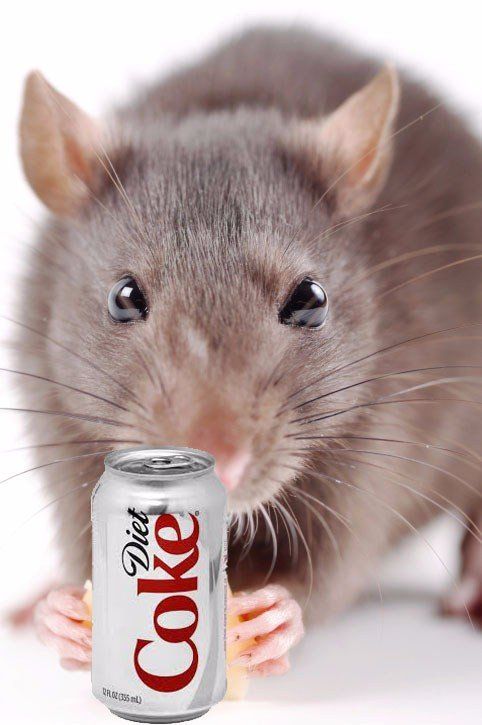Blog Post
Are Artificial Sweeteners Killing You Softly?
- por Cone Escobari
- •
- 25 ene, 2017
- •
Strumming your pain with their sweetness...
Do you remember when you had your first taste of Coke Zero?
That first hit of aspartame in your mouth, literally tasted like melted asphalt. "What is this crap?!"
That's a typical reaction. It's almost as if you'd feel hardcore going for the regular.
"Give me back my calories!!!".
The thing is, you quickly get used to the taste of aspartame and artificial sweeteners, and like all things Coca-Cola Co. produces, they find a way into your life.
Suddenly, you find yourself choosing Coke Zero every time you get the chance to, as your taste buds get used to the taste of the super sweet aspartame. Ah! The sweetness without the guilt!
...until someone cuts your fun and tells you "You shouldn't be drinking that bro, that s**t causes cancer!"
*Bro then proceeds to light up a cigarette in the cab home*
It's been years since I've made the switch to Zero drinks, and I gotta say, at some point I was really worried that their sweetness was killing me softly, so I decided to embark on a journey to the deepest ends of Pubmed.com to find out for myself if there's anything wrong with choosing Zero over Sugar.
That first hit of aspartame in your mouth, literally tasted like melted asphalt. "What is this crap?!"
That's a typical reaction. It's almost as if you'd feel hardcore going for the regular.
"Give me back my calories!!!".
The thing is, you quickly get used to the taste of aspartame and artificial sweeteners, and like all things Coca-Cola Co. produces, they find a way into your life.
Suddenly, you find yourself choosing Coke Zero every time you get the chance to, as your taste buds get used to the taste of the super sweet aspartame. Ah! The sweetness without the guilt!
...until someone cuts your fun and tells you "You shouldn't be drinking that bro, that s**t causes cancer!"
*Bro then proceeds to light up a cigarette in the cab home*
It's been years since I've made the switch to Zero drinks, and I gotta say, at some point I was really worried that their sweetness was killing me softly, so I decided to embark on a journey to the deepest ends of Pubmed.com to find out for myself if there's anything wrong with choosing Zero over Sugar.
Where did this cancer story began?
I quickly found out that the first study linking artificial sweeteners to cancer dated back to 1970.
This study showed that a combo of saccharin and cyclamate caused bladder cancer in lab rats.
This study showed that a combo of saccharin and cyclamate caused bladder cancer in lab rats.

Years later, the mechanism in which this artificial sweetener combo caused bladder cancer, was found to be specific to rats, and couldn't be replicated in other animals or humans.
I found this and this other study, from 2004 (and I'm sure there's others were these came from), demonstrating that neither saccharin or cyclamate is carcinogenic.
I found this and this other study, from 2004 (and I'm sure there's others were these came from), demonstrating that neither saccharin or cyclamate is carcinogenic.
Once you've been accused of a crime, you've already lost. Even if you are found not guilty.
If you haven't watched the Netflix series "Making a Murdered", stop reading this article, grab a Coke Zero and go take care of that.
If you have, then you know how, when someone has been accused of a crime he didn't even commit, the whole world can start to see him as a criminal as he steps into court.
It's as if artificial sweeteners never recovered from that one bastard study from 1970, even though we have proof that the results didn't translate to humans.
If you have, then you know how, when someone has been accused of a crime he didn't even commit, the whole world can start to see him as a criminal as he steps into court.
It's as if artificial sweeteners never recovered from that one bastard study from 1970, even though we have proof that the results didn't translate to humans.
Then came aspartame
As the use of aspartame became more popular, scientist who couldn't figure out why people were getting more brain tumors since 1980 had to link the both, even though they didn't know for sure whether people getting brain tumors actually consumed artificial sweeteners.
They conclude that aspartame safety needs to be reviewed because it is potentially carcinogenic.
They conclude that aspartame safety needs to be reviewed because it is potentially carcinogenic.

I'm not kidding. You can check the study out
yourself.
The scientists used another study done on rats to justify their conclusion, where rats given massive amounts of aspartame, starting developing brain tumors.
The scientists used another study done on rats to justify their conclusion, where rats given massive amounts of aspartame, starting developing brain tumors.
Since the scientific community is so cool and open minded, they re-opened the case.
Once again, researchers were out to find if aspartame causes brain tumors. Three studies followed finding no association between brain tumors and aspartame consumption.
Other studies done on animals, weren't able to replicate the aspartame-induced brain tumors found in the original rat study.
Once again, researchers were out to find if aspartame causes brain tumors. Three studies followed finding no association between brain tumors and aspartame consumption.
Other studies done on animals, weren't able to replicate the aspartame-induced brain tumors found in the original rat study.
We've tested artificial sweeteners for everything
Scientist then proceeded to study, analyze, and associate artificial sweeteners to find out if their use correlated to other cancers, including breast, pancreatic, stomach, colon, and endometrium (the inner lining of the uterus) with no correlation found.
So, based on the science we have today I don't think artificial sweeteners are a risk factor for cancer.
*sips coffee with splenda*
So, based on the science we have today I don't think artificial sweeteners are a risk factor for cancer.
*sips coffee with splenda*
But are artificial sweeteners good for fat loss?
My main motivator to make the switch to diet drinks, and artificial sweeteners in general, was to purposely lower my daily calories, reduce my carb intake and lose some unwanted fat, skipping the deprivation that comes from cutting soft drinks from your diet.
This turned out great for me. I don't miss regular soda and I'm able to stay decently lean year round without feeling like I'm being restrictive.
But does science confirm my experience?
I found this really good study done on overweight folks. The subjects in the study were given artificial sweeteners for 10 weeks in supplemental form. A control group was used, and they were given sucrose for 10 weeks. The researchers let the participants eat whatever they wanted during the time of the experiment.
The subjects who were given sucrose, ended up increasing their total carbohydrate consumption, and gaining body weight and fat mass, while the guys and girls who were given the sweetener had small but significant decreases in sugar intake, and maintained their weight.
This results are cool, but pretty obvious, since the sucrose group increased their total calories and the other group did not.
So then I found this more recent study, done by the American Beverage Association on a pretty large group.
303 men and women were employed, and all of them were going through a weight loss phase of 12 weeks. They divided the group and had half of them drink water only and the other half was allowed to have non-caloric beverages.
The group that was allowed to drink artificial sweetened beverages, lost 1.85 Kg more on average when compared to the water only group. The non-caloric beverage group reported significantly greater reduction in feelings of hunger than those in the water group during the 12 week experiment.
The researchers concluded that water is not superior to non-caloric, artificially sweetened beverage for fat loss during a weight loss program.
We have other trials, like this one done on adults, and this one reviewing the effectiveness of aspartame in helping with weight control that show similar positive results.
This turned out great for me. I don't miss regular soda and I'm able to stay decently lean year round without feeling like I'm being restrictive.
But does science confirm my experience?
I found this really good study done on overweight folks. The subjects in the study were given artificial sweeteners for 10 weeks in supplemental form. A control group was used, and they were given sucrose for 10 weeks. The researchers let the participants eat whatever they wanted during the time of the experiment.
The subjects who were given sucrose, ended up increasing their total carbohydrate consumption, and gaining body weight and fat mass, while the guys and girls who were given the sweetener had small but significant decreases in sugar intake, and maintained their weight.
This results are cool, but pretty obvious, since the sucrose group increased their total calories and the other group did not.
So then I found this more recent study, done by the American Beverage Association on a pretty large group.
303 men and women were employed, and all of them were going through a weight loss phase of 12 weeks. They divided the group and had half of them drink water only and the other half was allowed to have non-caloric beverages.
The group that was allowed to drink artificial sweetened beverages, lost 1.85 Kg more on average when compared to the water only group. The non-caloric beverage group reported significantly greater reduction in feelings of hunger than those in the water group during the 12 week experiment.
The researchers concluded that water is not superior to non-caloric, artificially sweetened beverage for fat loss during a weight loss program.
We have other trials, like this one done on adults, and this one reviewing the effectiveness of aspartame in helping with weight control that show similar positive results.
Conclusion
Artificially sweetened beverages are something very new to the human diet. So far, we've been studying their effects on health for more than 40 years, and the evidence shows that artificial sweetened beverages are not only safe, but can be helpful for weight loss, at least over the short term.
The idea that artificial sweeteners cause cancer, started from a study done on lab rats in 1970 and it's results were latter found not applicable to humans.
If you are looking to shield yourself from disease such as cancer, I think there are things much more harmful to our health which we have found to be directly linked to cancer, such as smoking or second hand smoke.
...cut that out first.
The idea that artificial sweeteners cause cancer, started from a study done on lab rats in 1970 and it's results were latter found not applicable to humans.
If you are looking to shield yourself from disease such as cancer, I think there are things much more harmful to our health which we have found to be directly linked to cancer, such as smoking or second hand smoke.
...cut that out first.
Compartir
Tweet
Compartir
Correo
Política de Privacidad | Descargo de Responsabilidad
BLACK TEAM TRAINING LLC, 8 The Green Suite A Dover, DE 19901, USA